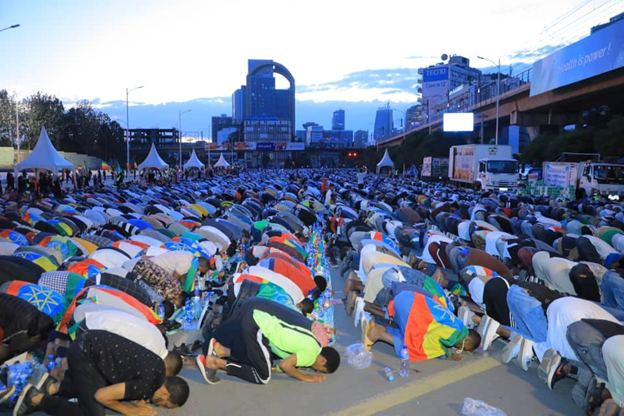
Eid Al-Fitr, also known as the “Festival of Breaking the Fast” is a significant religious holiday celebrated by Muslims around the world. This holiday marks the end of the holy month of Ramadan, a time of fasting, prayer and reflection for Muslims around the world. Here in Ethiopia, the holiday holds a great significance for all Muslim communities.
Here in Ethiopia, Eid al Fitr is celebrated all over the country with unique cultural traditions and customs that reflect the cultural values of the society. Ethiopians mark the day with a blend of cultural practices and religious rituals that are unique to Ethiopia. Wearing special traditional attire, giving Zakat al Fitr, sharing meals and performing prayers are common in the month of Ramadan and during the holiday.
After one month of Ramadan fasting all Muslim communities have celebrated Eid al Fitr yesterday colorfully, and several Ethiopian Muslims are also seen expressing their gratitude to Allah and expressing the value of holidays to further practice local cultures and togetherness.
The Ethiopian Herald had interviewed Deputy Head of Ethiopia Digital DiplomacyZayd Zeydan to hear his reflection about the role of religious and cultural holidays in bringing people of various backgrounds and enjoying common values.
According to him, Ethiopia is a land where several people with their distinct cultures, religions and identities are living in harmony. It is a land where the Christians live in harmony with their Muslim counterparts.
“Holidays are special times where these people are reflecting their togetherness. Eid al Fatir, which has several key religious aspects, is a true example of this.
Ethiopia as a land of multitudes has several cultural, public and religious holidays. And these special days have a significant role in unifying the public and express their togetherness. Eid al Fitr is one of these holidays where the Muslim community shows their love and compassion for others by giving to the less fortunate. The same is true for their Christian counterparts who always show love and compassion to their Muslim counterparts.”
This year`s Ramadan fasting month was unique for it coincides with the Ethiopian Orthodox Christians` Abiy fasting month. The followers of the two religions had shown their love and harmony through fasting and prayer. This was a special experience.
Every fasting day has significance to all Muslim and Christian communities of Ethiopia. Through fasting we were able to experience humbleness and feel the suffering others. While celebrating Eid al Fatir, even during the month of Ramadan every Muslim had been showing kindness to the needy people. This culture of helping one another is a common practice among the Muslim communities. This can take in the form of charitable donations, providing food and clothing to those people in need.
“Whenever there is an extra product, food or cloth it is a must to share some portion of it to others who are in need of our support. This is due to the fact that happiness should be a shared value. A given Muslim cannot be happy while his/her neighbor is suffering from hunger. One cannot enjoy Eid al Fitrwhile someone on the street is experiencing hunger. This is what the Creator needs from all humankinds. However, this practice should not be a seasonal experience. It must not be experienced either in times of fasting or holidays. It should be day-to-day activities of all humankinds.”
According to Zayd, in addition to enjoying sharing, Eid al Fitr is also a time where people practice forgiveness and reconciliation. “The month of Ramadan serves as a reminder of the importance of forgiveness and reconciliation to build strong and healthy relationships among the society. After all, what is the value of fasting and prayer without experiencing forgiveness? We, Ethiopians should embrace forgiveness and reconciliation as a means to ensure peace.”
Zaid also said that Ethiopia is a land of multitudes where people with different cultural backgrounds. These cultural and religious backgrounds should serve as a bridge to narrow all forms of differences. “Religious teachings and practices should serve as a means to bring peace and love. The more we practice the culture of forgiveness and nurture tolerance the more we can create heaven on earth; the more we cultivate love within our heart the more peaceful environment we can create for ourselves and the coming generation. Whenever we experience earthly peace we can also feel what heavenly peace means.”
According to him, the Muslim communities have an age-old culture of supporting people who are in need. This culture must extend to all human kinds that need our support. “The Muslim communities have already displayed compassion and support to the needy within the past weeks of fasting. This support should keep its momentum on other days as well.”
Emphasizing on the value of giving and helping people in need and practicing compassion, in his message to the young generation, Zaid said that embracing the culture of tolerance, respecting history and loving one another irrespective of cultural or religious difference should be their banner.
In connection to 1445th Eid al Fitr Ethiopian Islamic Affairs Supreme Council President, Haji Ibrahim Tufa has conveyed a message to all Muslim communities to mark the day prioritizing unity and brotherhood.
According to him, the Edi al Fitrir is a special day that will cement togetherness among the society. In this regard, Muslims should practice the culture of nurturing peace and compassion.
Despite occasional tension and conflicts in the past, Ethiopians have a long tradition of respect and tolerance for different religious beliefs. Interfaith marriages and friendships are common, and religious holidays and traditions are often celebrated by people of all faiths.
Ethiopia is a shining example of how people from different religious backgrounds can live in harmony. The country`s history of religious coexistence serves as a model for the rest of the world, showing that it is possible for people of different faiths to coexist and thrive together.
BY LEULSEGED WORKU
THE ETHIOPIAN HERALD THURSDAY 11 APRIL 2024





